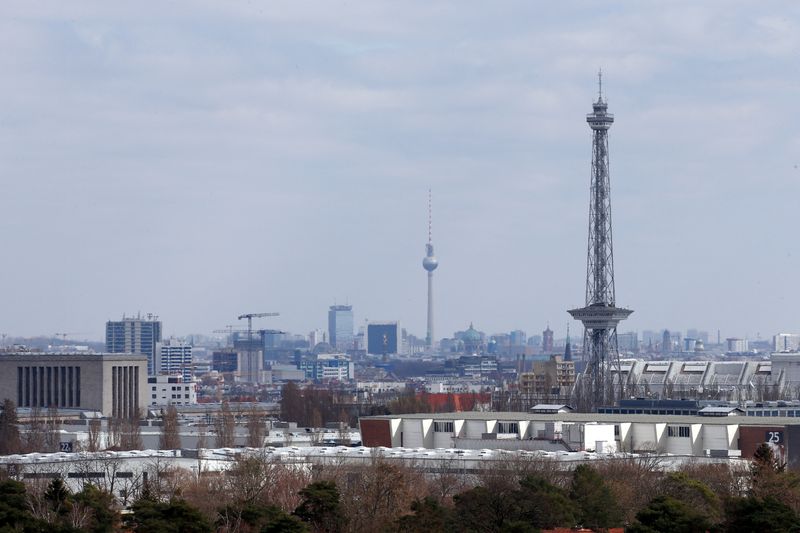By Mike Dolan
LONDON (Reuters) -Even if some yearn for pre-pandemic familiarity after three years of global economic disruption, the euro zone may not want or need to go back there.
One of the biggest questions in world markets is just how durable the changes wrought by COVID-19 - and the compounding energy shock that followed Russia's invasion of Ukraine - will be on economic behaviour, growth and inflation around the world.
There are usually two camps - one assuming an eventual return to a slow-growth square one; another sketching a volatile world of higher inflation, borrowing costs and 'geo-economic' realignment.
Policymakers still battling the related inflation spike and debt piles say it's too early to tell. And this week's World Bank update described the global economy as still 'hobbled' by three years of shocks and with its outlook still 'precarious'.
Bond fund giant Pimco's five-year view talks of a possible end to an era of "volatility-suppressing policies", leaving markets in for a bout of "heightened volatility" and aftershocks.
And yet there are scattered signs that the pre-pandemic world is re-emerging as energy prices and inflation gradually subside, worker shortages ease and cross-border travel revives.
The New York Federal Reserve's index of global supply chain pressures fell to its lowest level in May in the 25-year series.
And even in financial markets - also contending with a year of steep interest rate rises and pockets of banking stress - Wall Street's 'fear index' of equity market volatility fell to its lowest close this week since before the onset of the pandemic in 2020.
The picture in Europe - on the front line of the Ukraine conflict and forced into a natural gas rethink amid Russia's pipeline cuts - has been even harder to parse.
Consensus on the euro zone economic cycle has flipped twice in just six months - from recession angst to relief and back.
And now, suggesting a more unwelcome return to pre-2020 trends, the latest economic numbers are starting to register disappointment and underperformance again too.
As interest rates surge after years at near-zero levels, economic 'surprise' indexes for the bloc have plummeted to their most negative since the aftermath of the Ukraine invasion and the gas price explosion last summer.
That's happened even as global equivalents continue to match forecasts and the U.S. version has pushed back higher into consensus-busting territory. So much so, the gap between euro zone and U.S. surprise indexes is at its widest since 2020.
In the markets, the euro's surge since the final quarter of last year is fading again against a re-charged dollar. So too is the outperformance of euro zone stocks over the past year.
'BULL CASE'
With renewed cyclical angst, comes the old handwringing.
Long-held doubts have resurfaced about Europe's place in a potentially deglobalising world, with high debt and an ageing workforce. Added to that are fears for the competitiveness of its industry as China goes up the value chain and competes, while Europe still lags the now AI-fueled U.S. digital economy and struggles to retain access to pricey commodity imports.
But there's a more positive take. And that riffs on how the pandemic thunderbolt may have shaken the zone from its torpor.
In a report this week entitled "The Bull Case For Europe", TS Lombard economist Davide Oneglia insists the shift in euro zone fiscal and monetary policy mix due to the pandemic may have "profoundly positive" effects on long-term growth and assets.
"The old (euro zone) export-led growth model is dead - but this is good news," he said, adding that the new wave of public investment, greening of the economy and tight job market strengthen domestic demand amid signs of a productivity revival.
"Market narratives about euro zone long-term growth seem overly pessimistic," he said. "Don't fear the demise of the old, dysfunctional euro zone growth model."
Oneglia's main point is that a decade of balanced budget pressures, loose money and reliance on "internal devaluation" to regain competitiveness is over. And it's no longer optional anyway in a world reshaped by technological decoupling from China, which now becomes a rival for industrial markets rather than an export market.
The pandemic was a 'watershed', he said. The big picture was an entire change of model that trumps cyclical hiccups.
What's more, the end of the zero-interest period could also help boost aggregate productivity as it pulls the plug on a large number of 'zombie' companies - indebted, loss-making firms kept alive by extraordinarily cheap borrowing - and frees up capital for newer, more innovative startups.

If successful, the euro zone may never be going back to the pre-pandemic world.
The opinions expressed here are those of the author, a columnist for Reuters
(by Mike Dolan, Twitter: @reutersMikeD.Editing by Paul Simao)